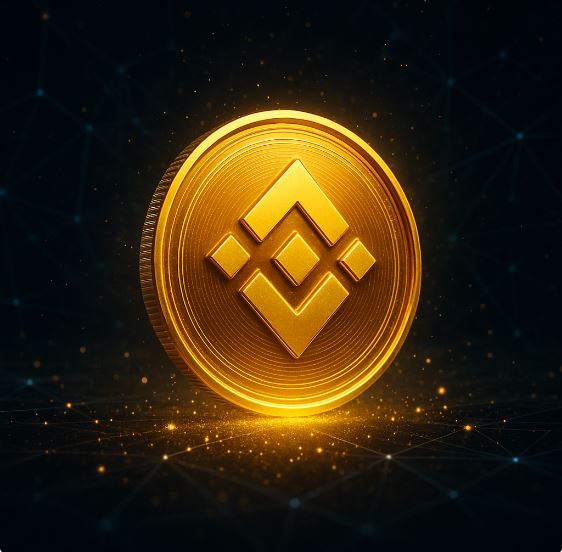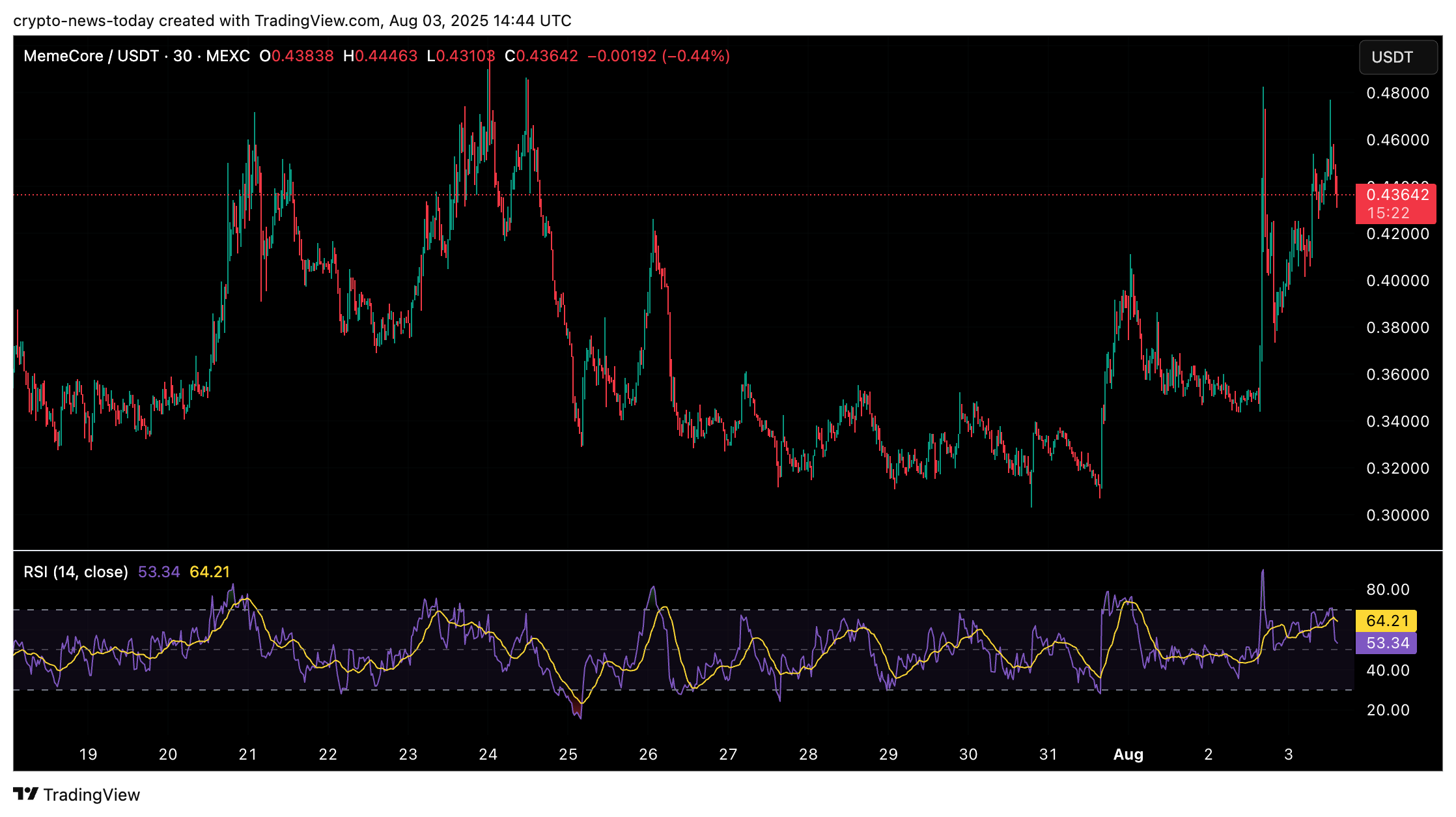Binance Coin (BNB) is a cryptocurrency developed by the Binance Bitcoin exchange and is its native currency. Initially introduced in 2017 on the Ethereum blockchain as an ERC-20 token, Binance Coin was later moved to its new blockchain, Binance Chain, which was introduced as a response to the growing number of transactions and related expenses of users within the Binance Community
Binance Coin will be a key part of numerous Binance ecosystem facilities, including lower trading fees on the Binance exchange, staking bonuses, and entrance to token sales through Binance Launchpad. As time passes, Binance Coin has evolved and extended its uses beyond its initial purpose to be utilised in various ways, such as in decentralised finance (DeFi), NFTs, etc.
The History of the Creation of Binance Coin
The Binance Coin got its first footing in the early days of Binance. In 2017, Changpeng Zhao (usually abbreviated CZ) established Binance to raise money to fund the development of an exchange. The ICO of Binance Coin was around 15 million dollars. Initially, the token was released on the Ethereum network as an ERC-20 token, which means that on the Ethereum network, it obeyed the rules and principles of the network.
In 2019, Binance also released its blockchain, Binance Chain, and BNB, which was transferred from the Ethereum platform to Binance Chain. The migration enabled BNB to enjoy faster transaction speeds and a reduced fee structure of Binance, which increased efficiency for Binance holders.
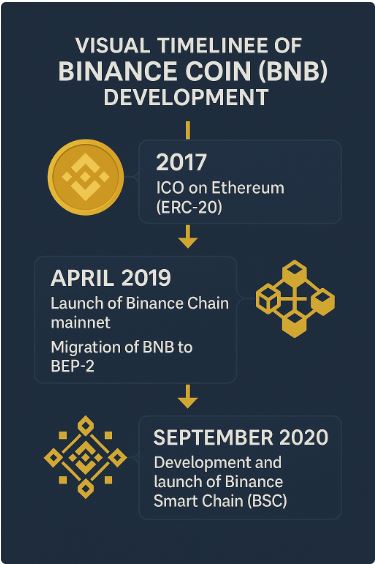
What Technology Does Binance Coin Use?
BNB originally operated on Ethereum, but transitioning to Binance Chain allowed it to leverage blockchain technology tailored for high-performance transactions. Binance Chain is known for its optimized block time and ability to support decentralized applications (dApps) within the Binance ecosystem.
The technology behind Binance Coin also includes Binance Smart Chain (BSC), a parallel blockchain to Binance Chain that facilitates smart contract functionality. BSC operates on a consensus mechanism called Delegated Proof of Stake (DPoS), which offers greater scalability and efficiency than traditional Proof of Work (PoW) systems like Bitcoin’s.
What is a Decentralized Network, and what is it used for by Binance Coin?
A decentralized network is one in which no person or organization is in control. Instead, it works through various nodes that cooperate in verifying transactions. The decentralized system enables users to control their money and eliminates centralization provided by centralized authorities, thus constituting a central element in the decentralized financing (DeFi) system.
Among other uses, BNB is decentralizedly applicable within the Binance ecosystem in the following ways:
On the Binance exchange, users can pay transaction fees with BNB at a discounted rate.
Decentralized exchanges: Binance allows you to invest in a Decentralized Exchange- Binance DEX, using BNB as the significant foothold in this trading and governance Decentralized Exchange environment.
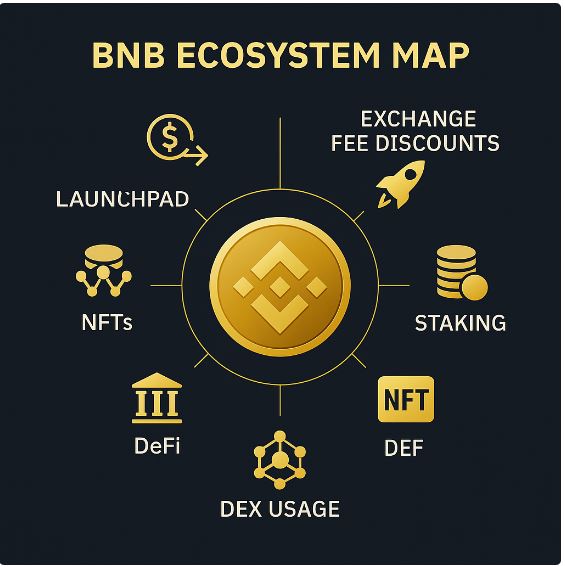
DeFi applications: BNB enables DeFi applications created on Binance Smart Chain.
What Is the Binance Coin TPS?
Binance Chain and Binance Smart Chain are high-speed transaction-oriented chains. The maximum transactions per second (TPS) Binance Smart Chain can handle is approximately 100, far ahead of Bitcoin’s 7 TPS. This gives traders and users of the Binance coin (BNB) the ability to trade and transact more effectively.
How Much Does it Cost to Transact with Binance Coin?
The fee to transact BNB on Binance Chain or Binance Smart Chain is relatively low—a few cents per transaction. This cost is also much cheaper than networks such as Ethereum, where gas fees can reach as high as 50 USD during network congestion.
What Environmental Impact does Binance Coin have?
Even though Binance Coin is powered by the Binance Smart Chain, which uses the more environmentally friendly Delegated Proof of Stake (DPoS) consensus system, the coin’s overall footprint can still be related to the Binance ecosystem as a whole. The network of the Binance Coin uses a lot less energy than systems that use Proof of Work, such as Bitcoin.
Binance has also discussed carbon-neutral activities to offset the carbon use in blockchain operations.
What are the Current and Future Developments in the Binance Coin Ecosystem?
More and more applications and use cases of BNB arise in the context of Binance. The most important developments are:
Introduction of Binance Launchpad: A new platform on which crypto projects could issue a token sale, frequently necessitating BNB as a token of participation.
• DeFi interest: DeFi on Binance Smart Chain (BSC) is increasing tremendously, and the number of DeFi projects using BNB as their governance and utility token has surged.
• Binance NFTs: The Binance NFT Marketplace is a recently launched platform where one can buy, sell, or create NFTs and usually transact using BNB.
Future improvements are expected to include further integration of BNB into the Binance ecosystem, such as cross-chain interoperability and collaborations with other DeFi solutions and more decentralized applications.
What are the advantages of Binance Coin over other cryptocurrencies?
Key Advantages:
• Cheap Transaction Rates: BNB has lower transaction fees than other cryptocurrencies, especially within the Binance network.
• Use case within Binance Ecosystem: BNB can be used in various ways, such as to receive a discount on trades, invest to participate in token sales, or stake as an asset in Binance’s upcoming DeFi projects.
• Quick Transactions: The Binance Smart Chain has faster transaction speeds than other blockchain networks, such as Bitcoin and Ethereum.
What are the Disadvantages of Binance Coin Compared to Other Cryptocurrencies?
Disadvantages:
• Centralization Risk: Although Binance Coin is implemented on decentralized platforms, the Binance exchange is centralized, and this aspect can be risky due to regulatory measures or server crashes.
• Scalability Issues: As fast as Binance Smart Chain is, it will face scalability problems as it expands.
• Reliance on Binance: The usefulness and price of BNB are directly connected to the success and growth of the Binance exchange and ecosystem.
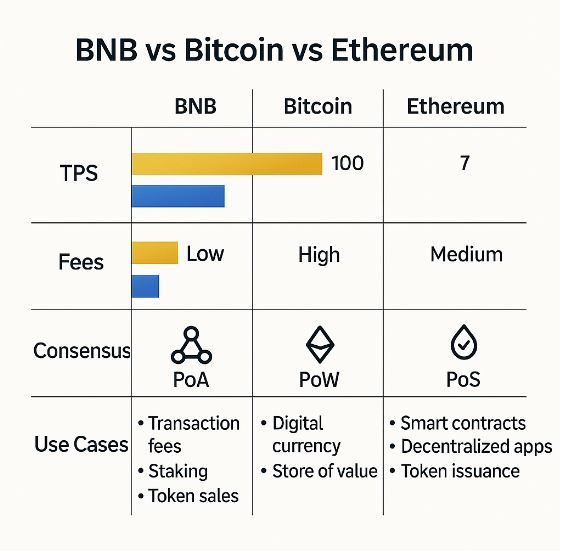
Is Binance Coin Anonymous?
Binance Coin transactions, like many other blockchain transactions, are pseudonymous. This implies that the transactions’ details are visible, but it does not disclose who the sender and receiver are unless matched with personal information. Nevertheless, it is essential to remember that since Binance is a centralized exchange, providing KYC (Know Your Customer) information will be necessary, which may impact the general anonymity of BNB use transactions.
Is Binance Coin Secure?
The security of the Binance Chain and Binance Smart Chain contributes to the security of BNB because they use robust cryptographic mechanisms to ensure the integrity and safety of the transactions. Furthermore, implementing Proof of Stake and Delegated Proof of Stake (DPoS) into Binance’s networks renders them immune to attacks, but this does not mean that any of the systems is risk-free.
Is Binance Coin Decentralised?
Binance Coin is a more decentralized coin than centralized fiat currencies, although it still has its critics and issues due to Binance’s centralized nature. Binance Coin is run on Binance Chain and Binance Smart Chain, which are more decentralized than traditional centralized systems such as banks. Nevertheless, Binance Coin is still controlled by the Binance team and its business decisions.
Can Binance Coin Replace Gold?
Although BNB can be used in many ways in the Binance ecosystem, its utility will likely not fully substitute gold. Gold is best understood as a store of value and inflation hedge, whereas BNB applications are related to transaction fees, staking, and DeFi. Nevertheless, the role of BNB as a digital gold can be compared to Bitcoin in the sense of a store of value and a means of hedging against market fluctuations.
Is Binance Coin Real Money?
In most countries, BNB is not legal tender; therefore, it does not function as traditional money in the traditional sense. However, it is used as a medium of exchange in the Binance system and as a store of value in the cryptocurrency sector.
How Do Countries and Governments Regulate Binance Coin?
Binance Coin regulation varies by country. The main problem with BNB in countries with severe cryptocurrency regulations, including the United States and China, is that the law tightly regulates the coin. Nevertheless, several nations, such as El Salvador, have shown increased acceptance of cryptocurrencies, and this presents new opportunities for integrating more Binance Coin into these economies. As a corporation, Binance has experienced regulatory issues in some countries, which may affect its expansion and the value of BNB.
Can Binance Coin Replace Fiat Currency?
Although Binance Coin has fantastic applications in the Binance ecosystem, it is unlikely that the coin will substitute fiat currency in the short term. Fiat currencies have government support and are accepted in most daily transactions, but BNB is restricted to the Binance environment and, therefore, can not be accepted as a universal currency.
Conclusion
Binance Coin (BNB) has become a cornerstone of the Binance exchange and Binance Smart Chain, providing significant utility within its ecosystem. Despite such negative issues as centralization and scalability, the BNB has already proven its worth and is a serious contender in the ever-changing cryptocurrency market. Whether BNB will contribute as a substitute for traditional fiat or become an essential piece of Binance’s decentralized future is yet to be determined. Still, its use in various blockchain applications reveals its potential as an innovative cryptocurrency.
Disclaimer
The information on this website is for educational purposes only, and investing carries risks. Always do your research before investing, and be prepared for potential losses.
18+ and Gambling: Online gambling rules vary by country; please follow them. This website provides entertainment content, and using it means you accept out terms. We may include partnership links, but they don't affect our ratings or recommendations.
Crypto promotions on this site do not comply with the UK Financial Promotions Regime and are not intended for UK consumers.


